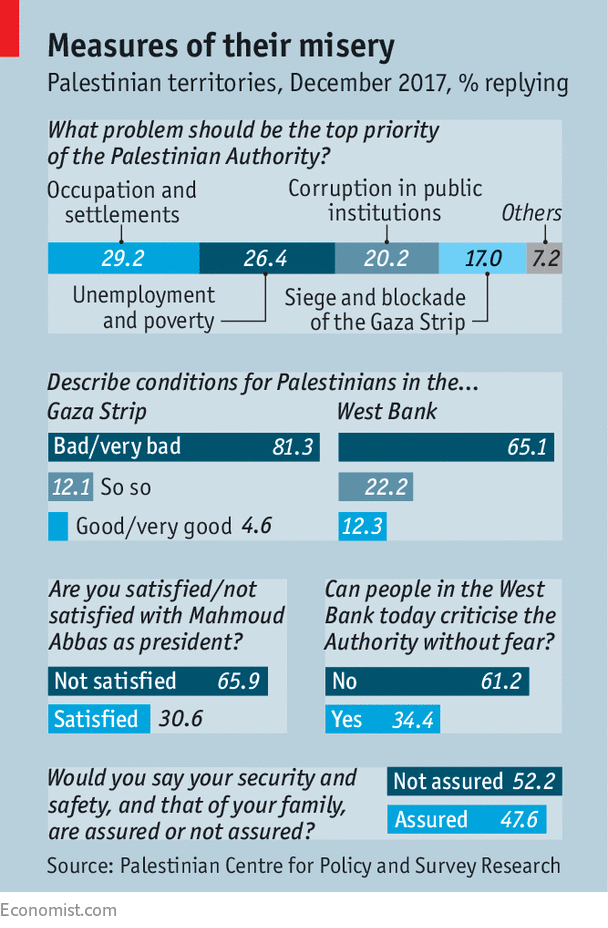Capital failure – Why the Palestinians have never felt so despondent
Blame poor leaders, distracted neighbours and a stalled peace process
Dec 19th 2017. Economist
The cause is Mr Trump’s decision on December 6th to recognise Jerusalem as Israel’s capital, while ignoring Palestinian claims to the city. The announcement has undermined America’s contention that it is a fair mediator. But it has also highlighted the decrepit state of the Palestinian national movement. Protests against the decision were relatively small—only a few thousand Palestinians turned out at their peak. Eight Palestinians were killed in the violence, but it was hardly on the scale of a new intifada, or uprising.
The muted reaction is, in part, a reflection of the Palestinians’ uninspiring leadership. For over a decade Mahmoud Abbas, their ageing president, has toggled between failed peace efforts and symbolic attempts to challenge Israel at the United Nations. Mr Abbas’s Fatah party was thrown out of the Gaza Strip in 2007 by Hamas, the militant Islamist group, which won a majority in parliament in 2006. But Hamas’s three wars with Israel have brought only misery to the territory, where half the population is unemployed. A glimmer of hope came in October, when the parties agreed to make up. But that deal, like the six reconciliation deals that preceded it, has not been implemented.
The Palestinians feel alone and despondent. Their cause has lost its resonance in a Middle East convulsed by civil wars and proxy battles between Iran, a Shia power, and Saudi Arabia, the region’s Sunni champion. Arab countries offered little more than empty condemnations of the Jerusalem decision. Saudi Arabia appears more interested in pleasing Israel, which has become a tacit ally in the conflict with Iran. The Palestinians say that what they have seen of America’s peace plan is insulting, but the Saudis have pressed them to support it. Even after Mr Trump’s speech, the Saudi foreign minister called his peacemaking efforts “serious”.

Ordinary Palestinians have more immediate concerns, such as food, water and shelter. In the West Bank young people dream of leaving for a better life in the West or the Gulf states. On the streets of Gaza, where Hamas once enjoyed broad support, it is now common to hear criticism of the group, and even nostalgia for the days when Israel controlled the territory. Asked to name the biggest problem in Palestinian society, fewer than a third cite the occupation. Many consider unemployment, poverty and corruption more urgent challenges (see chart).
National elections are eight years overdue. Many Palestinians have thus lost faith in politics. The only democratic exercise in recent years, a local election in May, had a turnout of 53%, down from 70% a decade earlier. The median age in the territories is 19, but the youngest plausible candidate to replace Mr Abbas is well over 60. With peace a dim prospect, many Palestinians are also losing interest in a two-state solution. A survey in August found that 52% of them still favour such a compromise. But support fell to 43% when the pollsters explained what a two-state solution might look like. There is also sharp disagreement over the alternatives, with roughly equal support for a binational state, an apartheid state, expelling the Jews and “other”.
Far from being the man to deliver a deal, Mr Abbas has become one of its biggest obstacles. He has little legitimacy to negotiate on behalf of his people, two-thirds of whom want him to resign. Increasingly authoritarian, he seems more concerned with domestic squabbles than the Israeli occupation. “His major goal is just staying alive in politics,” says Salah Bardawil, a member of Hamas. But Hamas has done no better.
It is telling that the one burst of successful Palestinian activism in 2017 came in East Jerusalem—where neither Fatah nor Hamas has much influence. When Israel installed new metal-detectors at the Al-Aqsa mosque in July, Palestinians staged protests and Israel backed down.
But some Palestinians living in the city are conceding the bigger fight. From 2014 to 2016 over 4,000 of them applied for Israeli citizenship, a threefold increase from a decade earlier. “The occupation isn’t going to end. Israel isn’t going away,” said a protester in July. “We don’t help ourselves if we pretend it will.”
